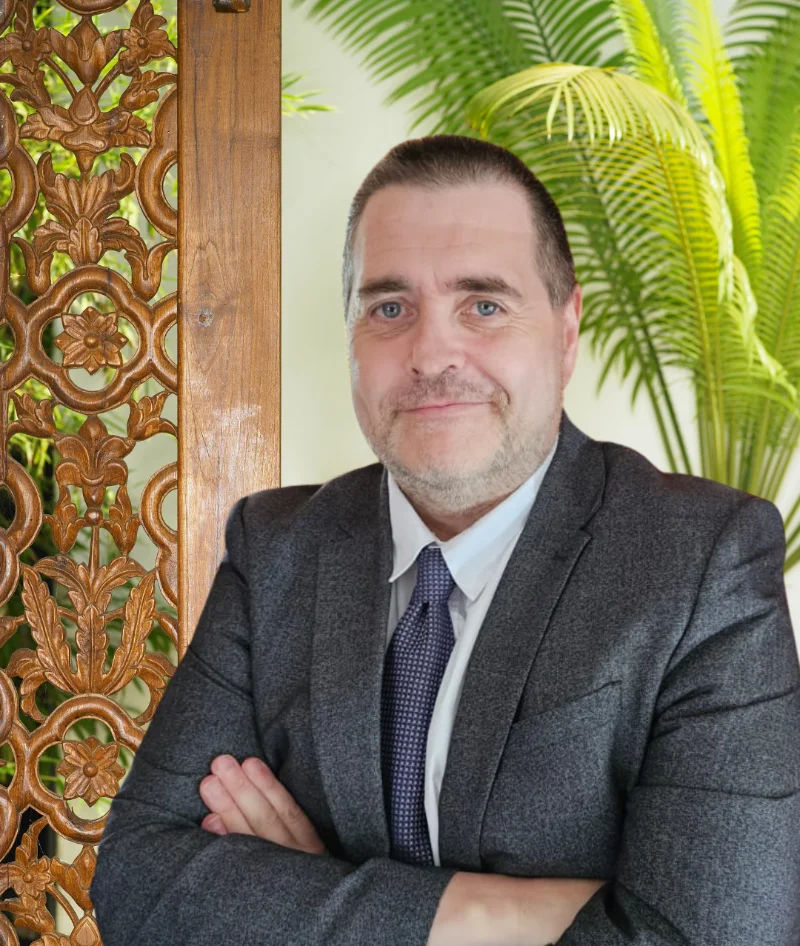Empowered Women: Overcoming Leadership Challenges with Confidence
Navigating the dual pressures of a high-stakes career and family demands can be tough. Dr. Terry McIvor shares insights on building resilience and confidence through cognitive restructuring and mindfulness. Ready to thrive? Read on.

Have you ever found yourself battling self-doubt and other people’s expectations while trying to climb the corporate ladder? I recently spoke with Dr. Terry McIvor, the chair of psychology and neuroscience therapy at Manipur International University. With his expertise in psychology, neuroscience, and mental resilience, Dr. Terry offers a unique perspective on leadership and psychological health that provides invaluable insights into the challenges individuals face in high-stakes environments today.
Women in leadership positions often encounter a distinct set of hurdles. From balancing the demands of a high-stakes career with family and the never ending list of expectations society places on us to the pervasive “imposter syndrome”, the journey is fraught with complexity. Dr. McIvor’s extensive background in Neuro-hypnotherapy and coaching has equipped him with the tools not only to understand these challenges but to offer effective strategies for navigating them.
In this article, Dr. McIvor shares his expert advice on building resilience and confidence, drawing from his extensive experience mentoring and guiding women leaders. Whether you’re an aspiring leader or someone looking to solidify your footing in a top-tier role, Dr. McIvor’s insights will provide practical, actionable strategies to empower you on your journey.
Table of Contents
Understanding the Unique Challenges faced by Women leaders
Challenge 1: Balancing Career and Family Responsibilities
One of the most significant challenges for women in leadership roles is balancing career demands with family responsibilities. Many ambitious women struggle to meet the high-pressure demands of their professional lives while also managing household and caregiving duties. The juggling act can be overwhelming and often leads to burnout.
Research indicates that women, even in top leadership positions, are more likely to be responsible for a larger share of domestic responsibilities compared to their male counterparts. This dual burden can impede their ability to perform optimally at work and maintain personal well-being.
Dr. McIvor acknowledges this dilemma and suggests the importance of setting clear boundaries and priorities. He stresses that effective delegation, both at home and in the workplace, is crucial. “Women often feel the need to do it all, but sharing responsibilities can make a significant difference in achieving a healthy balance”, he advises.
Challenge 2: Overcoming Societal Expectations
Societal norms and expectations can place additional pressure on women striving for leadership roles. Women are often judged by different standards compared to men, facing scrutiny not only for their professional choices but also for their personal decisions.
This pervasive issue can create an internal conflict, where the desire to conform to societal norms clashes with personal and professional aspirations. Women leaders may find themselves constantly working to prove their worth in environments that may harbour implicit biases.
Dr. McIvor highlights the importance of resilience in these situations. “Developing a strong sense of self and clarity about one’s values and goals can help women navigate these societal pressures”, he explains. He also emphasises the role of supportive networks, both within and outside the workplace, in bolstering confidence and providing a sounding board for challenges.
Challenge 3: Dealing with Imposter Syndrome
“Imposter syndrome” is a common and insidious challenge among successful women. It manifests as a persistent feeling of self-doubt and the fear of being exposed as a “fraud”, despite evident achievements and capabilities. This ‘syndrome,’ though not an actual medical condition, refers to a pervasive pattern of self-doubt and insecurity that can undermine confidence and hinder career progression.
Numerous studies have shown that women are more likely to experience self-doubt than men, particularly in male-dominated fields or upper echelons of leadership. The constant self-scrutiny can erode their self-worth, leading to anxiety and hesitation in seizing opportunities.
Dr. McIvor advises a multi-faceted approach to combat “imposter syndrome”, involving self-reflection, mentorship and the practice of positive self-talk. “Recognizing one’s achievements and receiving external validation from mentors and peers can significantly mitigate these feelings”, he points out. He also suggests regular journaling and visualisation exercises to reinforce a positive self-image and boost self-confidence.
Dr. McIvor’s Strategies for Building Resilience
Strategy 1: Cognitive Restructuring
Cognitive restructuring is a cornerstone of Dr. McIvor’s approach to overcoming mental barriers. This technique involves identifying and challenging negative thought patterns that undermine confidence and resilience.
- Identify Negative Thoughts: Start by recognizing the automatic negative thoughts that arise in stressful situations. For example, thoughts like “I’m not good enough” or “I’ll never succeed”.
- Challenge These Thoughts: Question the validity of these thoughts. Are they based on facts or assumptions? Are you overgeneralizing or catastrophizing?
- Reframe Your Thoughts: Replace negative thoughts with balanced, constructive ones. For instance, change “I’m not good enough” to “I have the skills and experience to handle this challenge” or “I’m constantly learning and improving”.
Dr. McIvor emphasises that this process can reshape the way you perceive obstacles, leading to a more resilient and adaptive mindset. “The goal is to rewire your brain to think positively, thereby enhancing your ability to cope with challenges”, he explains.
Strategy 2: Mindfulness and Stress Management
Mindfulness is another powerful tool in Dr. McIvo’s repertoire, aimed at improving emotional regulation and mental clarity. By practising mindfulness, you can become more aware of your thoughts and feelings without becoming overwhelmed by them.
- Mindful Breathing: Spend a few minutes each day focusing on your breathing. This simple exercise can reduce stress and increase your ability to stay calm under pressure.
- Progressive Muscle Relaxation: This involves tensing and then slowly relaxing each muscle group in your body, which can help alleviate physical and mental stress.
- Mindful Observation: Take a few moments to observe your surroundings without judgement. This practice can enhance your present-moment awareness and reduce anxiety.
Dr. McIvor notes that mindfulness practices can significantly improve your ability to handle stress and make thoughtful decisions, crucial attributes for effective leadership. “When you are mindful, you are better equipped to navigate complex situations and maintain your composure”, he says.
Strategy 3: Visualisation and Positive Affirmations
Visualisation and affirmations can serve as powerful tools for building confidence and achieving goals. Dr. McIvor advocates for the daily practice of visualising success and using positive affirmations to foster a resilient mindset.
- Visualisation: Spend a few minutes every day visualising your success in detail. Imagine yourself confidently navigating challenges, achieving your goals and receiving recognition for your achievements. This mental rehearsal can help you stay focused and motivated.
- Positive Affirmations: Create a list of positive statements that reinforce your abilities and potential. Examples include “I am a confident and capable leader”, “I handle challenges with grace”and “I am continually growing and improving”. Repeat these affirmations daily to reinforce a positive self-image.
According to Dr. McIvor, consistent practice of visualisation and affirmations can create neural pathways that support a confident and resilient mindset. “Your brain starts to believe what you tell it”, he says, “and this belief reflects in your actions and decisions”.
Strategy 4: Assertiveness Training
In leadership roles, assertiveness is vital for effective communication and decision-making. Dr. McIvor underscores the importance of developing assertive communication skills to navigate professional environments confidently.
- Understanding Assertiveness: Assertiveness lies between passivity and aggression. It involves expressing your thoughts, feelings and needs clearly and respectfully.
- Practising Assertive Communication: Use “I” statements to express your needs without blaming others. For example, “I need more information to make an informed decision” instead of “You never give me enough details”.
- Setting Boundaries: Learn to set and maintain boundaries in a professional setting. This might include saying no to additional tasks when your plate is already full or requesting support when needed.
Dr. McIvor suggests practising these skills in low-stakes environments before applying them in more critical situations. “The more you practise assertiveness, the more natural it becomes, empowering you to lead with confidence and clarity”.
By incorporating these psychological strategies into your daily routine, you can build the resilience needed to overcome the unique challenges faced by women in leadership roles. In the next section, we will explore practical applications of these strategies and share inspiring success stories.
Practical Applications and Success Stories
Applying psychological strategies in your daily professional life can significantly enhance your leadership capabilities. Here are some scenarios where Dr. McIvor’s techniques can be particularly effective:
- Managing High-Stakes Meetings:
- Cognitive Restructuring: Ahead of a critical meeting, identify any anxiety-inducing thoughts, such as “What if I fail?” Reframe these thoughts by focusing on your preparation and past successes.
- Mindfulness: Practise mindful breathing before the meeting to centre yourself, reduce anxiety and enhance focus.
- Navigating Difficult Conversations:
- Assertiveness Training: Use “I” statements to clearly articulate your perspective and needs, ensuring the conversation remains respectful and productive.
- Visualisation: Visualise the conversation going smoothly, with both parties reaching a mutually beneficial understanding.
- Balancing Multiple Responsibilities:
- Positive Affirmations: Each morning, remind yourself of your capabilities with affirmations like “I am capable of managing my responsibilities efficiently”.
- Mindfulness: Incorporate short mindfulness breaks throughout your day to maintain mental clarity and reduce stress.
Success Story: A Transformative Journey
One powerful example of the effectiveness of Dr. McIvor’s strategies involves a woman named Sarah, a senior executive at a multinational company. Sarah struggled with balancing her demanding job with her family responsibilities and she often felt overwhelmed and doubted her capabilities.
- Applying Cognitive Restructuring:
- Sarah started by identifying her negative thought patterns, such as “I’m failing at both work and home”. With Dr. McIvor’s guidance, she learned to challenge these thoughts, recognizing them as unrealistic and counterproductive. She reframed them to, “I am doing my best and I am continuously improving”.
- Mindfulness and Stress Management:
- She incorporated mindfulness practices into her daily routine. Every morning, Sarah spent ten minutes on mindful breathing exercises, which helped her start her day with a calm and focused mind. During work, she took brief mindful breaks, which enhanced her ability to handle stress.
- Visualisation and Positive Affirmations:
- Sarah practised visualisation by imagining herself successfully managing her day, from critical meetings to quality time with her family. She also used positive affirmations like “I am an effective leader” and “I balance my roles with grace and confidence”.
- Assertiveness Training:
- Through assertiveness training, Sarah learned to set boundaries at work and home. She started delegating tasks more effectively, clearly communicated her needs and confidently said no when necessary.
Outcome: Sarah’s transformation was profound. She felt more in control of her work and home life, her stress levels decreased and her productivity and job satisfaction increased. Her newfound confidence and resilience also made her a more effective leader, earning her respect and admiration from her colleagues and team.
Practical Takeaways
- Daily Practice: Incorporate these strategies into your daily routine to build resilience over time. Consistency is key to seeing lasting changes.
- Adaptation: Tailor these techniques to fit your unique circumstances and challenges. What works for one person may need adjustment for another.
- Seek Support: Don’t hesitate to seek mentorship or join supportive networks. Having a community can provide additional encouragement and accountability.
By applying these psychological strategies and learning from real-life success stories, you can navigate the unique challenges women in leadership roles face with resilience and confidence. In the next section, we will explore how to create a supportive environment and foster a culture that empowers women leaders.
Creating a Supportive Environment
Role of Mentorship and Networking
Mentorship and professional networks play a crucial role in the development and success of women in leadership. A strong support system helps navigate challenges and provides invaluable insights and encouragement.
- Finding the Right Mentor:
- Identify Your Needs: Determine what you seek in a mentor—whether it’s industry knowledge, leadership skills, or work-life balance strategies.
- Seek Connections: Look for mentors within your organisation, professional networks, or at industry conferences. Use platforms like LinkedIn to identify potential mentors who align with your goals.
- Build Relationships: Establish a rapport with potential mentors by engaging in meaningful conversations and showing genuine interest in their experiences and advice.
Dr. Terry McIvor underscores the importance of aligning with mentors who not only have the expertise but also resonate with your values and goals. He emphasises that the right mentor can provide perspective, challenge your limits and offer actionable advice tailored to your unique journey.
- Maximising Mentorship Benefits:
- Set Clear Goals: Define what you want to achieve through mentorship. Clear, actionable goals help both you and your mentor focus your efforts.
- Be Open to Feedback: Constructive criticism and diverse perspectives can significantly enhance your growth. Approach feedback with an open mind and a willingness to improve.
- Regular Check-ins: Maintain regular communication with your mentor to share progress, seek advice and discuss new challenges.
Dr. McIvor has consistently highlighted in his teaching and mentoring work the value of open-mindedness and adaptability in absorbing and implementing feedback. He remarks, “Mentorship is not just about seeking advice but about engaging in a dynamic exchange that fosters growth for both mentees and mentors”.
- Building a Professional Network:
- Engage in Industry Groups: Join professional associations, women-in-leadership groups and online forums to connect with like-minded individuals.
- Attend Events: Participate in conferences, workshops and networking events to expand your network and stay updated on industry trends.
- Offer Support: Networking is a two-way street. Offer assistance, share opportunities and recognize the achievements of others in your network.
Dr. McIvor’s own career exemplifies the benefits of robust professional networks. Through his establishment of professional guilds and participation in academic forums, he has created platforms for mutual growth and the exchange of innovative ideas. He often advises women in leadership to actively engage with and contribute to their professional communities as a means to foster learning and share success.
As Dr. McIvor puts it “A robust network and supportive mentorship can provide the encouragement and guidance needed to overcome obstacles and achieve personal and professional growth”. His words resonate with the essence of forging meaningful professional relationships that aid in navigating the landscape of leadership.
By focusing on building strong mentorship and networking opportunities, women in leadership can access the support and resources necessary to overcome their unique challenges.
If you’re ready to take the next step in your leadership journey and implement these transformative strategies, consider seeking out a mentor who can guide and support you. For personalised mentorship and advanced psychological insights, you can reach out to Dr. Terry McIvor. His extensive experience in coaching and mentoring can provide the tailored guidance you need to navigate your unique challenges and achieve your leadership goals.
About Dr Terry McIvor

Dr Terry McIvor, also known as the Synaptic Trainer™, is an Irish entrepreneur, academic, chemistry professor, master coach, coach mentor, and fellow of the Association of Coaching. With a Master’s degree in Psychology with Neuroscience and Psychiatric Applications, Dr Terry intertwines academic rigor with practical experience in his diverse coaching methods.
He serves as the Chair of Psychology and Neuroscience Therapy at Manipur International University. A clinical hypnotherapist and hypnotherapy trainer, he is also a skilled neuro-linguistic programming (NLP) practitioner and trainer.
Dr Terry is the driving force behind several key organizations, including the International Guild for Hypnotherapy, NLP, and 3 Principles Practitioners and Trainers (IGH3P®), an accredited professional body for well-being and mental health, and the Academy for International Science and Research (AISR STEM Academy). His work primarily focuses on fostering mental resilience and holistic well-being through various innovative programs:
- SynapGen® Transformational Coaching©: This program utilizes advanced neuroscience to build long-term mental and emotional resilience.
- NociPath Training and Coaching System™: Aiming to relieve chronic pain, this system blends hypnotherapy, NLP, neuroscience coaching, somatic tracking, and vagal nerve therapy for a comprehensive mind-body approach.
- Rejuvenise 360™: A holistic program targeting physical, mental, and emotional health to foster overall well-being.
- Neuro-Hypnotherapy: By combining neuroscience principles with hypnotherapy, this approach addresses issues ranging from stress reduction to cognitive clarity.
Check out membership options here.
IGH3P® maintains affiliations with international bodies such as the International Coach Register (ICR), the International Practitioner of Holistic Medicine (IPHM) and the International Regulator for Coaching and Mentoring, ensuring a high standard of practice in coaching and therapy.



